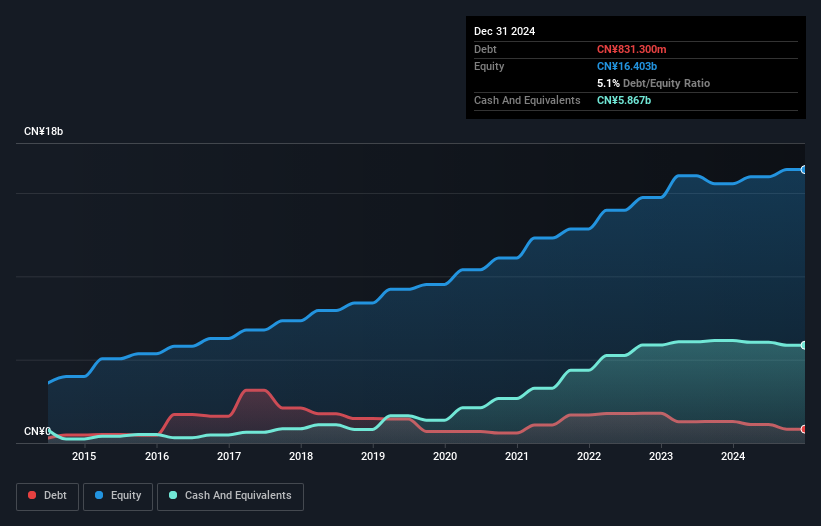Is China Medical System Holdings (HKG:867) A Risky Investment?
The external fund manager backed by Berkshire Hathaway's Charlie Munger, Li Lu, makes no bones about it when he says 'The biggest investment risk is not the volatility of prices, but whether you will suffer a permanent loss of capital.' When we think about how risky a company is, we always like to look at its use of debt, since debt overload can lead to ruin. We note that China Medical System Holdings Limited (HKG:867) does have debt on its balance sheet. But is this debt a concern to shareholders?
What Risk Does Debt Bring?
Debt assists a business until the business has trouble paying it off, either with new capital or with free cash flow. If things get really bad, the lenders can take control of the business. However, a more frequent (but still costly) occurrence is where a company must issue shares at bargain-basement prices, permanently diluting shareholders, just to shore up its balance sheet. Of course, plenty of companies use debt to fund growth, without any negative consequences. When we examine debt levels, we first consider both cash and debt levels, together.
What Is China Medical System Holdings's Net Debt?
You can click the graphic below for the historical numbers, but it shows that China Medical System Holdings had CN¥831.3m of debt in December 2024, down from CN¥1.29b, one year before. However, it does have CN¥5.87b in cash offsetting this, leading to net cash of CN¥5.04b.

A Look At China Medical System Holdings' Liabilities
Zooming in on the latest balance sheet data, we can see that China Medical System Holdings had liabilities of CN¥1.52b due within 12 months and liabilities of CN¥128.6m due beyond that. On the other hand, it had cash of CN¥5.87b and CN¥1.87b worth of receivables due within a year. So it actually has CN¥6.09b more liquid assets than total liabilities.
This surplus liquidity suggests that China Medical System Holdings' balance sheet could take a hit just as well as Homer Simpson's head can take a punch. On this view, lenders should feel as safe as the beloved of a black-belt karate master. Simply put, the fact that China Medical System Holdings has more cash than debt is arguably a good indication that it can manage its debt safely.
Check out our latest analysis for China Medical System Holdings
It is just as well that China Medical System Holdings's load is not too heavy, because its EBIT was down 39% over the last year. When it comes to paying off debt, falling earnings are no more useful than sugary sodas are for your health. When analysing debt levels, the balance sheet is the obvious place to start. But ultimately the future profitability of the business will decide if China Medical System Holdings can strengthen its balance sheet over time. So if you're focused on the future you can check out this free report showing analyst profit forecasts .
Finally, a business needs free cash flow to pay off debt; accounting profits just don't cut it. While China Medical System Holdings has net cash on its balance sheet, it's still worth taking a look at its ability to convert earnings before interest and tax (EBIT) to free cash flow, to help us understand how quickly it is building (or eroding) that cash balance. During the last three years, China Medical System Holdings produced sturdy free cash flow equating to 76% of its EBIT, about what we'd expect. This free cash flow puts the company in a good position to pay down debt, when appropriate.
Summing Up
While we empathize with investors who find debt concerning, you should keep in mind that China Medical System Holdings has net cash of CN¥5.04b, as well as more liquid assets than liabilities. The cherry on top was that in converted 76% of that EBIT to free cash flow, bringing in CN¥813m. So is China Medical System Holdings's debt a risk? It doesn't seem so to us. When analysing debt levels, the balance sheet is the obvious place to start. But ultimately, every company can contain risks that exist outside of the balance sheet. For example - China Medical System Holdings has 1 warning sign we think you should be aware of.
Of course, if you're the type of investor who prefers buying stocks without the burden of debt, then don't hesitate to discover our exclusive list of net cash growth stocks, today.
Have feedback on this article? Concerned about the content? Get in touch with us directly. Alternatively, email editorial-team (at) simplywallst.com.
This article by Simply Wall St is general in nature. We provide commentary based on historical data and analyst forecasts only using an unbiased methodology and our articles are not intended to be financial advice. It does not constitute a recommendation to buy or sell any stock, and does not take account of your objectives, or your financial situation. We aim to bring you long-term focused analysis driven by fundamental data. Note that our analysis may not factor in the latest price-sensitive company announcements or qualitative material. Simply Wall St has no position in any stocks mentioned.
① During the campaign period, US stocks, US stocks short selling, US stock options, Hong Kong stocks, and A-shares trading will maintain at $0 commission, and no subscription/redemption fees for mutual fund transactions. $0 fee offer has a time limit, until further notice. For more information, please visit: https://www.webull.hk/pricing
② More than 40M Downloads Globally : data based on Webull Technologies Limited's internal statistics as of July 14, 2023.
Webull Securities Limited is licensed with the Securities and Futures Commission of Hong Kong (CE No. BNG700) for carrying out Type 1 License for Dealing in Securities, Type 2 License for Dealing in Futures Contracts and Type 4 License for Advising on Securities.

English